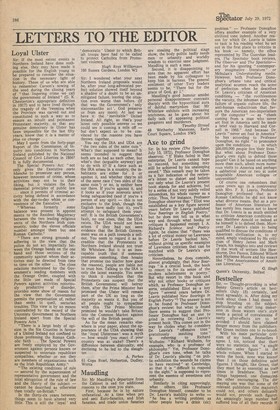Loyal Ulster
Sir: If the most recent events in Northern Ireland have done nothing else, they may have made it possible for the English young to be prepared to consider the situation in the necessary light of history. Those of us who are able to remember Carson's sowing of the seed during the closing years of " that lingering crime we call the government of Ireland" (G. K. Chesterton's appropriate definition in 1917) and to have lived through the tragedy of the 'twenties when the Province was carved out and constituted in such a way as to ensure an inbuilt and permanent Protestant majority, so that any genuine democracy in Ulster has been impossible for the last fifty years, know that it is a matter of plus ca change ...
May I quote from the forty-page Report of the Commission of Inquiry into conditions in Northern Ireland published by the National Council of Civil Liberties in 1936? It is fully documented.
The Special Powers Act "not only gives the Executive carte blanche to prosecute any person, however innocent of crime, whose activities may not be to their liking, but it violates the fundamental principles of public law ... since it permits of criminal activity being defined in accordance with the day-to-day whim or convenience of the Executive."
"Whereas formerly some balance was present in appoint ments to the Resident Magistracy between the two leading religious sects of the Northern Irish community, today the eleven officials number amongst them but one Roman Catholic."
"There are strong grounds of adhering to the view that the police do not act impartially between the Orange bands on the one hand and those sections of the community against whom their activites may be directed from time to time on the other ... The close relations maintained by the Government's leading members with the Orange Order, coupled with the little use made of Special Powers against activities notoriou sly productive of disorder, provides some show of reason for the view that the Government permits the perpetuation of, rather than seeks to quell, sectarian troubles. This view is by no means contradicted by the record of the Unionists Government in Northern Ireland apart from the Special Powers Acts."
"There is a large body of opinion in the Six Counties in favour of a United Ireland not confined to those professing the Roman Catholic faith ... The Special Powers are freely employed by the Government against persons known or suspected to entertain republican sympathies, whether or not they are members of organisations such as the Irish Republican Army." "The existing conditions of rule — secured by the supercession of representative government and the total abrogation of the rule of law and the liberty of the subject — cannot be described as otherwise than totally un-British."
In the thirty-six years between, things seem to have altered very little. This is still the ' loyal ' and
'democratic' Ulster to which British troops have had to be called to protect Catholics from Protestant violence.
Hugh Ross Williamson 193 Sussex Gardens, London W2








































 Previous page
Previous page